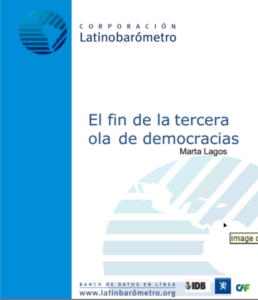The generational shift is profound and fundamental to understanding what is happening in Latin America (and around the world), argues Michael Shifter, the president of the Inter-American Dialogue, a Washington-based think tank focusing on Western Hemisphere affairs.
Street protests roiled cities across the world in 2019. Latin America in particular experienced greater social unrest than at any time in recent memory. Political crises and mass mobilizations broke out in Haiti, Honduras, Ecuador, Peru, Bolivia, Colombia, Chile and elsewhere, he writes for The New York Times:
The upheaval stems from many of the region’s persistent problems, more salient in some countries than others: economic stagnation, politicized judiciaries, corruption, crime and, in a few cases, authoritarian rule. Latin America is the second most unequal region in the world. The failure to address these problems — and to fulfill promises made — has caused governments to lose legitimacy in the eyes of their people. These citizens are increasingly dissatisfied with how democracy works — or doesn’t work — in their countries.
 “After living in Latin America over the course of five decades, I have seen too few sustained efforts to create paths of social mobility that are secure and stable,” says Shifter, a former Latin America program director at the National Endowment for Democracy (NED). “Undoing that trend demands not only sound growth and redistribution policies, but also the opening up of greater access to economic and political power, breaking the nexus between private interests and the political class, and attaining equal justice under the law.”
“After living in Latin America over the course of five decades, I have seen too few sustained efforts to create paths of social mobility that are secure and stable,” says Shifter, a former Latin America program director at the National Endowment for Democracy (NED). “Undoing that trend demands not only sound growth and redistribution policies, but also the opening up of greater access to economic and political power, breaking the nexus between private interests and the political class, and attaining equal justice under the law.”
As nearly 25 million Peruvians head to the polls to elect a new parliament later this month, here’s a Latin American riddle: How does a nation practiced in the art of political seppuku sustain one of the hemisphere’s most consistently flourishing economies? What’s behind the disconnect? Bloomberg analyst Mac Margolis asks:
Only 8% of Peruvians said they trust their congress, compared with 21% regionally, Latinobarometro found in 2018. ….Political scientist Carlos Melendez, who teaches at Diego Portales University in Chile, reckons that after a ruinous run of profligacy, hyperinflation and authoritarian spasms through the 1980s and 1990s, Peruvians have since struck an unstated civic pact. While politicians are ecumenically reviled and fair game for popular derision, most everyone agrees on the basic rules of economic engagement and fiscal sobriety. Caudillos, populists and enchanters on the left and right may come and go, but market-friendly policies have prevailed. RTWT







